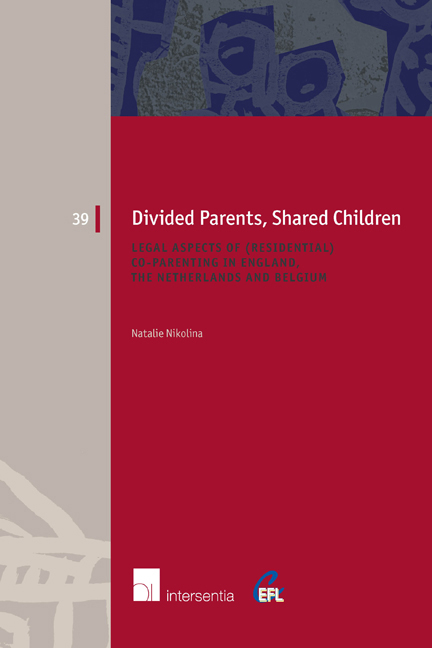 Divided Parents, Shared Children
Divided Parents, Shared Children Book contents
- Frontmatter
- Acknowledgements
- Contents
- Chapter 1 Introduction
- Chapter 2 International and European framework
- Chapter 3 The English legal system
- Chapter 4 The Dutch legal system
- Chapter 5 The Belgian legal system
- Chapter 6 Socio-psychological aspects of residential co-parenting
- Chapter 7 Comparative synthesis
- Chapter 8 Conclusions and recommendations
- References
- Samenvatting
- About the author
- European Family Law Series
Chapter 7 - Comparative synthesis
Published online by Cambridge University Press: 12 December 2017
- Frontmatter
- Acknowledgements
- Contents
- Chapter 1 Introduction
- Chapter 2 International and European framework
- Chapter 3 The English legal system
- Chapter 4 The Dutch legal system
- Chapter 5 The Belgian legal system
- Chapter 6 Socio-psychological aspects of residential co-parenting
- Chapter 7 Comparative synthesis
- Chapter 8 Conclusions and recommendations
- References
- Samenvatting
- About the author
- European Family Law Series
Summary
INTRODUCTION
The legal systems discussed in Chapters 3, 4 and 5 have been selected for various reasons. All three contain provisions on the joint exercise of parental responsibilities after separation and allow residential coparenting arrangements. All three have gone through family law reform that started roughly in the 1990s and over the course of the following three decades rapidly changed post-separation parenting.
While the three countries have encountered similar societal changes over the last three decades – more women working full time, fathers demanding more equality when it comes to parenting after separation, same-sex families – the way the law has reacted to these issues has not been the same. Each legal system has its own way of solving the problems which arise and it may be possible to learn from each other, or at least to look at complicated issues from different perspectives to further understand these issues. This is the main purpose of this chapter, and by extension, of this thesis.
The following sections give an overview of the similarities between the three legal systems and highlight the most interesting differences between them.
HISTORY AND BACKGROUND OF THE LAW
When looking at the legal background of the three legal systems presented in this book, on the face of it the most notable distinction can be drawn between the English legal system on the one hand, and the Dutch and Belgian legal systems on the other. This is because the English legal system belongs to the common law family, while the other two systems are part of the civil law tradition. In practice, however, this distinction is not as all defining as it may seem. While case law indeed carries more weight in the English legal system than the Dutch, and definitely the Belgian systems, the main provisions concerning parentage and parental responsibilities in all three systems are contained in written law (the Civil Code for the Dutch and Belgian systems, and the Children Act 1989 for the English system respectively) and have only been explained or developed more through case law.
- Type
- Chapter
- Information
- Divided Parents, Shared ChildrenLegal Aspects of (Residential) Co-Parenting in England, the Netherlands and Belgium, pp. 193 - 204Publisher: IntersentiaPrint publication year: 2015


